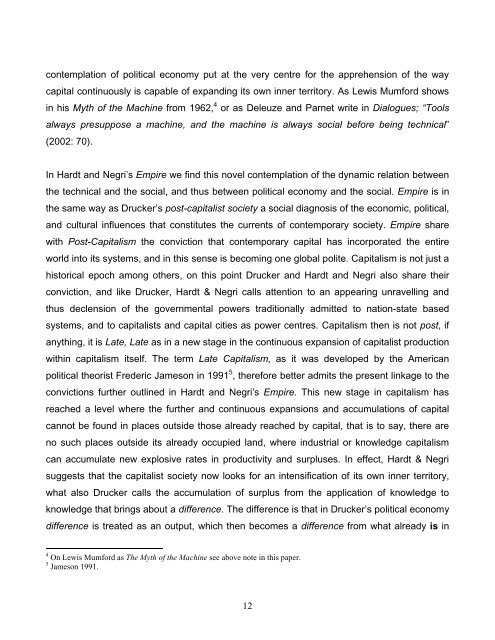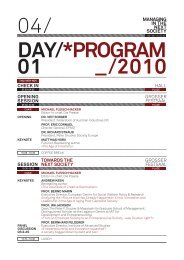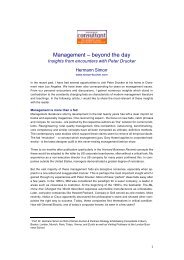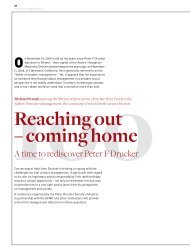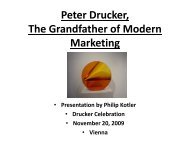From Industrial Capitalism to Taylorian Late Capitalism
From Industrial Capitalism to Taylorian Late Capitalism
From Industrial Capitalism to Taylorian Late Capitalism
You also want an ePaper? Increase the reach of your titles
YUMPU automatically turns print PDFs into web optimized ePapers that Google loves.
contemplation of political economy put at the very centre for the apprehension of the way<br />
capital continuously is capable of expanding its own inner terri<strong>to</strong>ry. As Lewis Mumford shows<br />
in his Myth of the Machine from 1962, 4 or as Deleuze and Parnet write in Dialogues; “Tools<br />
always presuppose a machine, and the machine is always social before being technical”<br />
(2002: 70).<br />
In Hardt and Negri’s Empire we find this novel contemplation of the dynamic relation between<br />
the technical and the social, and thus between political economy and the social. Empire is in<br />
the same way as Drucker’s post-capitalist society a social diagnosis of the economic, political,<br />
and cultural influences that constitutes the currents of contemporary society. Empire share<br />
with Post-<strong>Capitalism</strong> the conviction that contemporary capital has incorporated the entire<br />
world in<strong>to</strong> its systems, and in this sense is becoming one global polite. <strong>Capitalism</strong> is not just a<br />
his<strong>to</strong>rical epoch among others, on this point Drucker and Hardt and Negri also share their<br />
conviction, and like Drucker, Hardt & Negri calls attention <strong>to</strong> an appearing unravelling and<br />
thus declension of the governmental powers traditionally admitted <strong>to</strong> nation-state based<br />
systems, and <strong>to</strong> capitalists and capital cities as power centres. <strong>Capitalism</strong> then is not post, if<br />
anything, it is <strong>Late</strong>, <strong>Late</strong> as in a new stage in the continuous expansion of capitalist production<br />
within capitalism itself. The term <strong>Late</strong> <strong>Capitalism</strong>, as it was developed by the American<br />
political theorist Frederic Jameson in 1991 5 , therefore better admits the present linkage <strong>to</strong> the<br />
convictions further outlined in Hardt and Negri’s Empire. This new stage in capitalism has<br />
reached a level where the further and continuous expansions and accumulations of capital<br />
cannot be found in places outside those already reached by capital, that is <strong>to</strong> say, there are<br />
no such places outside its already occupied land, where industrial or knowledge capitalism<br />
can accumulate new explosive rates in productivity and surpluses. In effect, Hardt & Negri<br />
suggests that the capitalist society now looks for an intensification of its own inner terri<strong>to</strong>ry,<br />
what also Drucker calls the accumulation of surplus from the application of knowledge <strong>to</strong><br />
knowledge that brings about a difference. The difference is that in Drucker’s political economy<br />
difference is treated as an output, which then becomes a difference from what already is in<br />
4 On Lewis Mumford as The Myth of the Machine see above note in this paper.<br />
5 Jameson 1991.<br />
12


